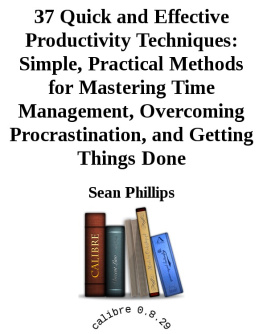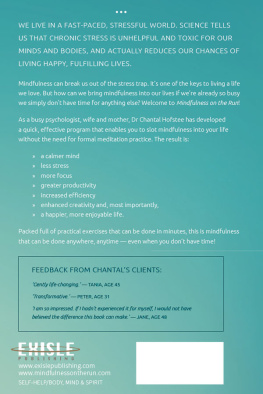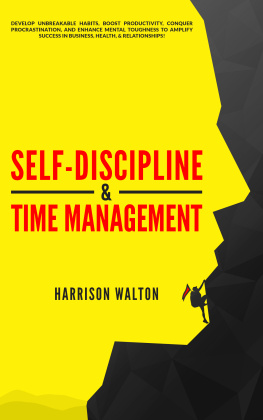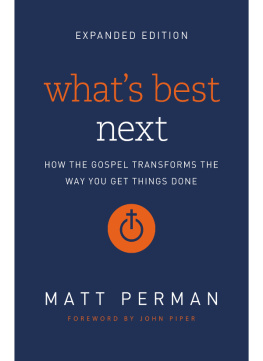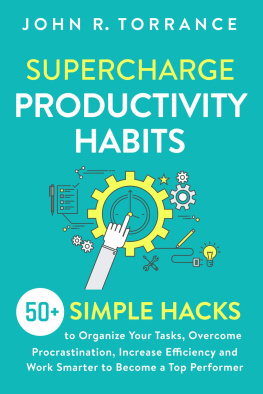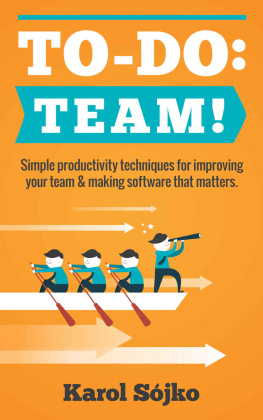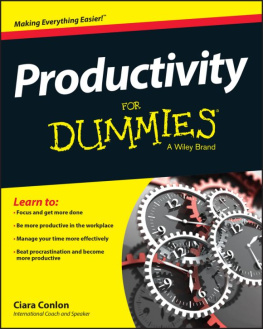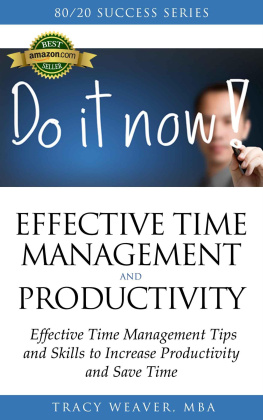37 Quick and Effective
Productivity Techniques
By
Sean Phillips
Introduction
As you may have noticed, this is a pretty short book. Thats intentional, and its done for a very specific purpose. The ideas laid out here arent things you should spend a lot of time reading about; theyre things you should spend a lot of time doing .
This book isnt arranged in any particular order, so feel free to just jump to any page and start taking action on what you learn.
The advice in this book is simple, but dont let the simplicity fool you: these ideas are powerful. Theyve been gathered from the worlds top productivity experts, and they work. Give them the respect they deserve, and youll be well rewarded.
Dont Multi-Task
If you consider yourself a good multi-tasker, I have bad news for you:
Multi-taskers are worse than single-taskers at everything.
Sorry to be the one to break this to you, but this has actually been proven a number of times in scientific studies. One of the most notable examples was an experiment conducted in 2005 at Kings College. In this experiment, the experimenters administered IQ tests to three groups of people:
The first group did nothing but perform the IQ test.
The second group was distracted by e-mail and ringing phones while taking the test.
The third group took the test while stoned. Yes, s toned .
As you might have guessed, the first group did better than the other two groups. No surprises there.
Heres the interesting part: the e-mailers actually did worse than the stoners.
Thats right: trying to multi-task, even with simple things like checking your email, is actually worse for your productivity than getting high.
Not to mention less fun.
This makes sense when you think about it. For example, which is harder: to just sit down and do your math homework, or to do your math homework while talking to someone? Its not just harder, its impossible. You have to do either one or the other.
So when you have an important task to work on: turn of your cell phone, dont check your email, dont take a break every ten minutes to check out your favorite blog, etc. You should either be in full work mode, or full relaxation mode. Not some weird semi-productive gray area in between.
Dont Eat Fatty Foods Before
Doing Anything Important
Obviously we all know that eating high-fat food isnt good for our bodies. The thing that a lot of people dont know, however, is that it also isnt good for our brains.
A number of recent studies on the relationship between food and brain function have revealed that when a person eats foods that are high in fat, it significantly lowers their ability to process and remember information.
To put it simply, eating fatty foods actually makes you more stupid on a measurable neurological level.
So whats the take-away from this? If you have an important presentation coming up, or if you have to study for a big test, or if you just know that youre going to have to work really hard on something for a while, make sure that you eat really healthy beforehand. If you spend the day eating lots of fruits and vegetables, youll have more energy, be more mentally alert and focused, and just generally feel better, which will allow you to take whatever your big project is and really knock it out of the park.
Take Frequent,
Scheduled Breaks
Most people work best in 60 to 90 minute blocks of time, followed by 5-10 minute breaks.
Working at least 60 minutes will give you plenty of time to get into a good flow (and actually take advantage of it once youre there), and keeping it under 90 minutes prevents you from getting burned out. Youll have to experiment in order to find out what an ideal time increment is for you, but try to keep it in this range.
Also, its important that during your 5-10 minute breaks, you really take a break . Dont let yourself do semi-productive tasks out of guilt (such as checking email). You should ideally do something that is relaxing and lets your brain rest, such as taking a quick 5 minute nap, going for a short walk, etc.
This lack of mental stimulation will keep your brain from becoming over-saturated with minutia, so that when you return to your project, your mind will be completely clear and ready to get back down to work.
Dont Try To Schedule Everything
This may seem counter-intuitive to people who pride themselves on how organized they are, but trying to schedule every minute of your day is wasteful and counterproductive.
What happens to your precious schedule if something gets delayed early in the day? Everything else gets pushed back, and you feel stressed out. Not helpful.
Its also frequently impossible to figure out how long a given task is going to take in advance, so the idea of organizing your whole day is futile from the start.
Some tasks certainly need to be scheduled. But trying to set an exact time frame for every activity in your day is not only impossible, but wouldnt even be worth if it were possible.
Daily routines are supposed to make things easier, not more complicated. So when you set your schedule, make sure that you control it, rather than the other way around.
Be Stingy With Your
Time And Effort
Most people are pretty careful when it comes to how they use tangible things like money, but terrible when it comes to using their time, energy, and effort.
For example, some people will spend an hour of their time in a given week clipping coupons that will save them about $5, despite the fact that they make $15 an hour at their job. If someone offered to give you $5 in exchange for $15, would you take them up on it? Hopefully not.
Unfortunately, people tend to spend most of their time and effort on things that make them neither happy nor productive.
Reading a novel is an example of something that will make you happy, but isnt particularly productive. Working on starting a personal business is an example of something that usually isnt very fun, but its super productive.
Most people, however, decide not to do fun things (because it makes them feel irresponsible) or productive things (because its hard), and instead focus most of their time on mostly useless busy-work, like checking email, doing minor chores and errands, etc. It makes them feel busy, but it doesnt require much actual work.
You only get so much time in your life. If youre going to be spending it on something, make sure you spend it on something really responsible that will have a big impact on your life, or something really irresponsible that you really enjoy.
Start Treating Your Attention
Like A Tangible Resource
We have ways of measuring certain intangible resources, like time, but so far no one has come up with a way of measuring our mental focus. Because of this, people often waste their attention on a massive scale without even realizing it.
Think about this for example:
Its a Saturday afternoon, and since youve spent the morning relaxing, you feel like it might be a good idea to get something productive done. You check your email, and discover that a big problem has come up at work that you cant do anything about until Monday.
How much do you think youll enjoy the rest of your weekend? Probably not much. You have enough time to relax, work on personal projects, etc, because a little part of your brain is worrying about what youre going to do at work on Monday. You have the time, but not the attention to use it well.
Guard your mental attention with as much diligence as you guard your money. It is far more valuable.
Learn Speed Reading
Speed reading is an incredibly valuable skill that will serve you for the rest of your life. The amount of written information that people have to consume on a daily basis is staggering . Even people who dont read books spend a surprising amount of time reading work reports, articles, blogs,
Next page
